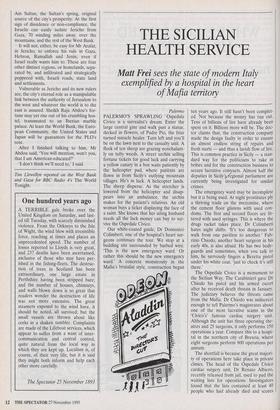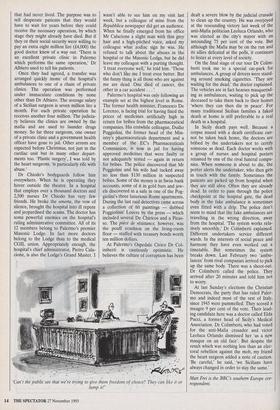THE SICILIAN HEALTH SERVICE
Matt Frei sees the state of modern Italy
exemplified by a hospital in the heart of Mafia territory
Palermo PALERMO'S SPRAWLING Ospedale Civico is a surrealist's dream. Enter the large central gate and walk past a statue, decked in flowers, of Padre Pio, the friar turned miracle healer. Turn left and you'll be on the lawn next to the casualty unit. A flock of ten sheep are grazing nonchalant- ly on tufty weeds. A street urchin selling fortune tickets for good luck and carrying a yellow canary in a box waits patiently by the helicopter pad, where patients are flown in from Sicily's outlying mountain villages. He's in luck. A helicopter lands. The sheep disperse. As the stretcher is lowered from the helicopter and disap- pears into an ambulance, the urchin makes for the patient's relatives. An old woman buys a ticket displaying the face of a saint. She knows that her ailing husband needs all the luck money can buy to sur- vive the Ospedale Civico.
Our white-coated guide, Dr Domenico Colimbert, one of the hospital's heart sur- geons continues the tour. We stop at a building site surrounded by barbed wire. `This is the new emergency ward. Or rather this should be the new emergency ward.' A concrete monstrosity in the Mafia's brutalist style, construction began
ten years ago. It still hasn't been complet- ed. Not because the money has run out. Tens of billions of lire have already been spent on it. Billions more will be. The doc- tor claims that, the construction company made the design faulty in order to ensure an almost endless string of repairs and fresh starts — and thus a lavish flow of lire. This is common practice in Sicily — a stan- dard way for the politicians to rake in bribes and for the construction business to secure lucrative contracts. Almost half the deputies in Sicily'Aional parliament are currently being investigated for similar crimes.
The emergency ward may be incomplete but it is being used. At night prostitutes ply a thriving trade on the mezzanine, where the cement floor glistens with used con- doms. The first and second floors are lit- tered with used syringes. This is where the drugs racket takes place. Dr Colimberti hates night shifts. 'It's too dangerous to walk from one pavilion to another.' Fab- rizio Chiodo, another heart surgeon in his early 40s, is also afraid. He has two body- guards and sometimes, when you talk to him, he nervously fingers a Beretta pistol under his white coat, 'just to check it's still there.'
The Ospedale Civico is a monument to the Sicilian Way. The Carabinieri gave Dr Chiodo his pistol and his armed escort after he received death threats in January. The judiciary believes the threats came from the Mafia. Dr Chiodo was indiscreet enough to tell Palermo's magistrates about one of the most lucrative scams in the `Civico's' famous cardiac surgery unit. Although the unit has three operating the- atres and 25 surgeons, it only performs 150 operations a year. Compare this to a hospi- tal in the northern city of Brescia, where eight surgeons perform 800 operations per annum.
The shortfall is because the great majori- ty of operations here take place in private clinics. The head of the Ospedale Civico cardiac surgery unit, Dr Renato Albiero, recently released from jail, used to pad the waiting lists for operations. Investigators found that the lists contained at least 40 people who had already died and scores that had never lived. The purpose was to tell desperate patients that they would have to wait for years before they could receive the necessary operation, by which stage they might already have died. But if they or their social security were willing to pay an extra eight million lire (£4,000) the good doctor knew of a way out. 'There is an excellent private clinic in Palermo which performs the same operation,' Dr Albiero used to tell his patients.
Once they had agreed, a transfer was arranged quickly inane of the hospital's ambulances to one of a chain of private clinics. The operation was performed under immaculate conditions by none other than Dr Albiero. The average salary of a Sicilian surgeon is seven million lire a month. For each private operation he receives another four million. The judicia- ry believes the clinics are owned by the mafia and are used to launder drugs money. So far three surgeons, one owner of a private clinic and a government health officer have gone to jail. Other arrests are expected before Christmas, not just in the cardiac unit but in many other depart- ments too. 'Plastic surgery', I was told by the heart surgeons, 'is particularly rife with abuse.'
Dr Chiodo's bodyguards follow him everywhere. When he is operating they hover outside the theatre. In a hospital that employs over a thousand doctors and 2,500 nurses Dr Chiodo has very few friends. He broke the omerta, the vow of silence, brought the hospital into ill repute and jeopardised the scams. The doctor has some powerful enemies on the hospital's ruling administrative committee. All of its 12 members belong to Palermo's premier Masonic Lodge. In fact more doctors belong to the Lodge than to the medical CGIL union. Appropriately enough, the hospital's chief administrator, Pietro Cala- cione, is also the Lodge's Grand Master. I wasn't able to see him on my visit last week, but a colleague of mine from the Repubblica newspaper did get an audience. When he finally emerged from his office Mr Calacione a slight man with thin grey hair and a high-pitched voice, asked my colleague what zodiac sign he was. He refused to talk about the abuses in the hospital or the Masonic Lodge, but he did leave my colleague with a parting thought. 'I treat everyone well,' he told him. 'Those who don't like me I treat even better. But the funny thing is all those who are against me are dead. One died of cancer, the other in a car accident .. . '
Palermo's hospital was only following an example set at the highest level in Rome. The former health minister, Francesco De Lorenzo, is facing trial for having fixed the prices of medicines artificially high in return for bribes from the pharmaceutical companies. His erstwhile colleague, Duilio Poggiolini, the former head of the Min- istry's pharmaceuticals department and a member of the EC's Pharmaceuticals Commission, is now in jail for having approved medicines that were faulty or not adequately tested — again in return for bribes. The police discovered that Mr Poggiolini and his wife had tucked away no less than $130 million in suspected bribes. Some of the money is in Swiss bank accounts, some of it in gold bars and jew- els discovered in a safe in one of the Pog- giolini's three luxurious Rome apartments. During the last raid detectives came across a collection of 60 paintings — dubbed Poggiolinis' Louvre by the press — which included several De Chiricos and a Picas- so. The piece de resistance, however, was the pouff ecushion on the living-room floor — stuffed with treasury bonds worth ten million dollars.
At Palermo's Ospedale Civico Dr Col- imberti is cautiously optimistic. He believes the culture of corruption has been 'Can't the public see that we're trying to give them freedom of choice? They can like it or lump it!' dealt a severe blow by the judicial crusade to clean up the country. He was overjoyed at the resounding victory last week of the anti-Mafia politician Leoluca Orlando, who was elected as the city's mayor with an astounding 75 per cent of the vote. But although the Mafia may be on the run and its allies defeated at the polls, it continues to fester at every level of society.
On the final stage of our tour Dr Colim- berti took me to a special car-park for ambulances. A group of drivers were stand- ing around smoking cigarettes. 'They are waiting for the dead,' the doctor explained. The vehicles are in fact hearses masquerad- ing as ambulances, waiting to pick up the deceased to take them back to their homes 'where they can then die in peace'. For many traditional Sicilian families a faked death at home is still preferable to a real death in a hospital.
In Sicily death pays well. Because a corpse issued with a death certificate can- not be taken back home, the doctors are bribed by the undertakers not to certify someone as dead. Each doctor works with a group of nurses and hospital porters retained by one of the rival funeral compa- nies. When someone is about to die, the porter alerts the undertaker, who then gets in touch with the family. Sometimes the patients are picked up from hospital when they are still alive. Often they are already dead. In order to pass through the police checkpoint at the hospital gate, the dead body in the fake ambulance is sometimes even fitted with a drip. The police don't seem to mind that the fake ambulances are travelling in the wrong direction, away from the hospital. 'The system works rela- tively smoothly,' Dr Colimberti explained. Different undertakers service different wards. In the interests of social peace and harmony they have even worked out a timetable. But sometimes the system breaks down. Last February two 'ambu- lances' from rival companies arrived to pick up the same body. There was a shoot-out. Dr Colimberti called the police. They arrived after 20 minutes and told him not to worry.
At last Sunday's elections the Christian Democrats, the party that has ruled Paler- mo and indeed most of the rest of Italy, since 1945 were pummelled. They scored a meagre 9 per cent of the vote. Their lead- ing candidate here was a doctor called Elda Pucci, a former head of Sicily's Medical Association. Dr Colimberti, who had voted for the anti-Mafia crusader and victor Leoluca Orlando dismissed her 'as a new masque on an old face'. But despite the result which was nothing less than an elec- toral rebellion against the mob, my friend the heart surgeon added a note of caution. 'Be careful,' he said, 'we Sicilians have always changed in order to stay the same.'
Matt Frei is the BBC's southern Europe cor- respondent.











































































 Previous page
Previous page